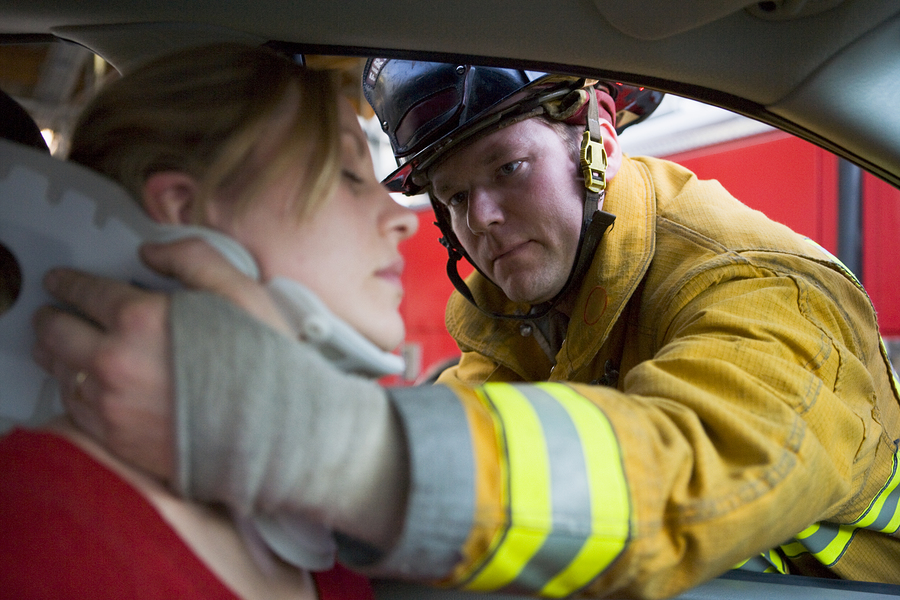
Semi-trucks are much larger than normal vehicles, weighing 20-30 times more than the average car on the road. When an accident involving a truck happens, the passengers and drivers in other vehicles can suffer serious, potentially fatal injuries, which are often more severe and extensive compared to standard car crashes due to the truck’s larger size and weight. Many of these injuries come with long recoveries and painful, chronic conditions. These injuries can leave the affected parties unable to perform critical functions. In addition, it may render them incapable of making a living.
Introduction to Common Truck Accident Injuries
Truck accidents can result in severe and life-altering injuries, affecting not only the physical well-being of victims but also their emotional and financial stability. Common truck accident injuries include traumatic brain injuries, spinal cord injuries, neck injuries, and internal injuries, among others. These injuries can be devastating, requiring extensive medical treatment, rehabilitation, and often resulting in long-term disabilities. It is essential for truck accident victims to seek medical attention immediately and consult with experienced truck accident attorneys to navigate the complex legal process and secure the compensation they deserve.
Causes of Truck Accidents
Truck accidents can occur due to various factors, including driver fatigue, distracted driving, speeding, and equipment failure. Truck drivers who operate their vehicles for extended periods without adequate rest can increase the risk of accidents. Additionally, hazardous materials and improper loading of cargo can contribute to the severity of truck accidents. Trucking companies must ensure that their drivers adhere to traffic laws, including obeying speed limits, red lights, and stop signs, to minimize the risk of accidents. Furthermore, regular maintenance of vehicles and proper training of drivers are crucial in preventing truck accidents.
Common Truck Accident Injuries
Back and Neck Injuries
Back and neck injuries are the most common injuries in motor vehicle accidents involving tractor-trailers and trucks. They range from minor neck pain to dislocated discs. Herniated discs are a specific type of back injury that can result from truck accidents, causing severe pain, numbness, or weakness in the limbs. Nearly every movement involves the neck and back. These injuries often require long-term pain management and therapeutic treatment.
Spinal Cord Injuries
Spinal injuries are unique in that they may sometimes not be immediately noticeable. That is why medical diagnosis and treatment after a car accident, especially a trucking accident, are vital. Severe spinal cord injuries may require surgical intervention to ensure proper healing and recovery. It’s not uncommon for spinal injuries to lead to ongoing mobility issues. In some cases, they can cause paralysis.
Head and Brain Injuries
Head trauma can cause a multitude of life-altering conditions. Trauma to the skull and brain can cause traumatic brain injuries (TBIs) and damage or destruction of brain tissue. Each year, nearly 3 million people suffer from TBIs. Traumatic brain injuries can lead to symptoms such as confusion and memory loss. Like spinal cord injuries, these may not be detected until some time after the accident.
Whiplash often causes head injuries. Symptoms of brain trauma include headaches, confusion, nausea, vision problems, slurred speech, and bleeding from the head or nose. It is important for accident victims who are experiencing those symptoms to seek immediate medical attention.
Burns
In the US, nearly half a million people require treatment annually for a burn injury. Truck accidents can result in severe burns, particularly involving hazardous materials or fuel. During a crash, a victim can suffer a burn injury due to airbag deployment, contact with dangerous chemicals, electrocution, or contact with a live wire. Exposure to hot metal or steam as well as car fires and explosions, is another contributing factor.
Medical professionals classify burns into three main categories depending on the depth of skin penetration. First-degree burns only damage the top layer of the skin and can generally be treated quickly. Second-degree burns go to the second layer of the skin and cause blistering and a higher degree of pain.
Third-degree burns involve all the layers of the skin and cause permanent damage to tissue, nerves, and blood vessels. They can cause life-threatening damage that may even require amputation.
Amputation and Disfigurement
Disfigurement is permanent damage done to bone or soft tissue like ligaments, skin, and muscles. Road rash and exposure to chemicals can also lead to these types of injury. The surface-level scarring is devastating, and damage can go even deeper. Disfigurements often cause nerve damage and limited mobility as well.
One way truck accidents lead to amputation is crushing limbs under the heavy vehicle weight. Amputations leave survivors feeling disfigured and incomplete. Those who undergo amputations could need lifelong assistance to complete tasks they could once do independently.
Internal Injuries
Internal injuries are one of the leading causes of death worldwide. Airbags help minimize the impact of a crash, but the deployment of airbags from a truck traveling at high speed can cause blunt abdominal trauma. This may injure the bladder, spleen, liver, pancreas, or kidneys.
Internal bleeding occurs when there is bleeding from any vessel or internal organ. This can be fatal and may be difficult to detect early on. Immediate medical care is necessary in the event of internal bleeding.
Broken Bones
In a trucking accident, more bones are broken than in a car accident because of the sheer force. Head-on collisions are significant contributors to broken or fractured bones in truck accidents. Truck accidents commonly result in blunt force trauma, causing broken and shattered bones. These injuries are mostly treatable, but they are painful and can require a long healing time. Breaking a bone does increase the risk of developing osteoporosis.
Soft Tissue Injuries
Even low-impact collisions can cause soft tissue injuries. Blunt trauma from truck accidents can cause significant soft tissue injuries. These injuries consist of the bones and joints stretching and tearing. This often involves the tearing of tendons, muscles, and joints. Also, a victim can suffer cuts and lacerations from loose personal belongings in a vehicle and from shattered glass or sharp metal.
Symptoms of soft tissue injury include neck pain, jaw pain, blurry vision, neck stiffness, tingling of the shoulders, nausea, headache, vertigo, and concussion.
These injuries often cause a significant amount of pain, and this pain may continue after the injury has healed. Other long-term effects are abnormal curvature of the spine, narrowing of the space between the discs and spine, and muscle spasms.
Paralyzing Injuries
The spinal cord transmits messages from the brain to different parts of the body through nerve channels. The sudden impact of a truck accident can cause severe spinal cord damage, leading to paralysis. When the spine is traumatized in a trucking accident, the spinal cord sustains damage, and this disrupts the messages from the brain to the rest of the body. This injury generally occurs due to a traumatic injury to the spine. According to the Mayo Clinic, automobile and truck accidents are the leading cause of spinal cord injuries, leading to paralysis.
Factors Contributing to Injuries
Several factors contribute to the severity of injuries sustained in truck accidents. These include the speed of the vehicles involved, the angle of impact, and the type of vehicle involved. The location of the impact and the presence of safety features, such as seat belts and airbags, can also significantly affect the severity of injuries. In some cases, internal injuries, such as internal bleeding, may not be immediately apparent, emphasizing the importance of seeking immediate medical attention. Soft tissue injuries, including sprains, strains, and contusions, can also occur, often requiring physical therapy for recovery.
Seeking Medical Attention
After a truck accident, it is crucial for victims to seek medical attention immediately, even if they do not feel injured. Some injuries, such as internal injuries or concussions, may not present symptoms right away. Prompt medical evaluation can help identify and treat injuries before they worsen. Having a medical record of injuries is essential for any potential legal claims. Documentation of injuries and treatment can support a victim’s case when seeking compensation for medical expenses, lost wages, and pain and suffering. Experienced truck accident attorneys can help victims navigate the legal process and secure the compensation they deserve.
Fatal Truck Accidents
Fatal crashes involving trucks are more likely to occur than those involving cars. Over 4,000 people die annually from truck accidents, many because of the impact of the collision. This can cause families to be torn apart and leave surviving loved ones with hospital bills, medical bills, and funeral expenses.
When to Hire a Truck Accident Attorney
At The Eberst Law Firm, we have the experience, resources, and team to help you with your case while you concentrate on your recovery. We offer a free consultation to discuss your unique situation and provide guidance on your legal options. You can contact us online or call us at 772-225-4900.
